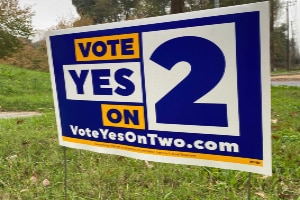The 2020 election is a big one for a variety of different reasons. Voters across the nation have a big choice to make with Donald Trump and Joe Biden in this year’s Presidential Election. Local and state races are always important as well.
Legal sports betting is on the ballot in four states. Voters in Louisiana, Maryland, Nebraska, and South Dakota will have the opportunity to make their voices heard as to whether or not they want to embrace an expansion of gambling that includes sports betting. The initiatives, amendments, and measures in those states are simply Yes or No questions as to whether or not sports betting should be permitted in the state. After that, lawmakers and legislators will decide on how it will all work.
Along with providing helpful picks and previews here at ATS.io, we also cover a variety of different aspects with regards to sports betting in the United States. Our state pages tell you about what is available in your jurisdiction and also highlight ways in which you can still bet legally, even if your state does not take bets. Our sportsbook promotions tell you about the places that have the best bonus offers.
We also look at industry news and the happenings in the business. With that in mind, let’s check out the four states with betting on the ballot and see what everything looks like.
Louisiana
Sports betting will be legal in Louisiana after Tuesday November 3, however not every location will have access to it. In the state of Louisiana, a measure such as thing will be adopted on a parish level, so each parish will have the ability to vote in favor or against sports betting.
Back in 2018, parishes had the ability to vote on daily fantasy sports (DFS). At that time, 47 of the 64 parishes voted to legalize daily fantasy sports. Many observers and analysts believe that a similar number will vote in favor of legalized sports betting.
How things progress after that point in Louisiana remains to be seen. Will Louisiana allow mobile and online betting when geolocation technology will have to distinguish between the illegal and legal areas with a high degree of sensitivity? Will Louisiana become a retail-only state like Mississippi and Arkansas?
Proponents of legalized sports betting have seen what other states have done and have seen the relatively meager tax revenue generated by Mississippi and Arkansas compared to places with online and mobile betting like Indiana, Colorado, and even Iowa, which has an in-person registration requirement, but then allows for online and mobile betting for those users.
Louisiana is the only state of the four that will be a lock to add sports betting, but we’ll see the degree to which it will be legalized. The tax revenue will go to support education.
Maryland
Question 2 in Maryland will require a Yes or No answer from voters as to whether or not sports betting will become legal in the Commonwealth. According to the state constitution, any measure that results in an expansion of gambling must be put to a vote, so this is the time for that vote.
This is only the first step in the process for Maryland. Many of their neighbors, including Washington D.C., Pennsylvania, and Delaware have legal wagering, but those states all go about it very differently. Virginia is also going to become a state with legal sports betting in 2021 when they officially launch.
If the sports betting measure passes, then lawmakers and legislators will discuss and deliberate the framework for what wagering in the state will look like, ranging from the number of licenses available to each of the state’s casinos and racetracks to the tax rates and how the money will be allocated.
Once again, the tax money from legal wagering would be put back into schools and Maryland Governor Larry Hogan was optimistic that sports betting would in fact pass on November 3.
Because Maryland already has several racetracks and casinos, much like Louisiana, and past expansions of gambling have made it through a vote, it seems like Yes to Question 2 is the odds-on favorite.
Nebraska
Suffice it to say that things are a little bit cloudier in Nebraska. Nebraska does not have widespread gambling, as only a handful of tribal casinos and gaming facilities are present in the Cornhusker State. The legalization of sports betting would entail an expansion of gambling that hasn’t really been seen in Nebraska.
To make matters even trickier, the actual language on the ballot lumps sports betting in with “games of chance”, which would imply that gaming facilities would be able to add table games like blackjack, craps, and roulette to their offerings. This would basically take the slot machine and keno halls and turn them into full, Vegas-style casinos.
It has been 16 years since a proposed expansion of gambling made it to the ballot in Nebraska and it failed.
Nebraska is losing lots of potential sports betting revenue to Iowa, as Lincoln and Omaha, Nebraska’s two biggest cities by a large margin, are both in close proximity to a state that allows sports betting and also has casinos right on the other side of the border. Iowa is an in-person registration state, which means that you must sign up and register in person to open a sports betting account, but that requirement is likely to end on January 1, 2021.
That would make it even easier for Nebraskans to bet on sports in Iowa. That has allowed pro-gaming groups in Nebraska the opportunity to appeal to the masses to “Keep the Money in Nebraska”. Whether or not that happens remains to be seen. Right now, we would say that the expansion of gaming is a slight underdog.
South Dakota
While Louisiana will not see a full-fledged approval of sports betting with the parish-by-parish voting system, the majority of the state will have legalized sports betting. In South Dakota, things are very different. SJR 501 would approve sports betting in the tiny gambling town of Deadwood, which is in the extreme western part of South Dakota.
It remains to be seen whether or not an online or mobile component would be applied down the line, but this would allow for retail sportsbooks in Deadwood and, because of federal law, the opportunity to open retail sportsbooks would be extended to tribal casinos in the state.
South Dakota, a deeply red state in political matters, has passed expansions of gambling exclusive to Deadwood and the tribal casinos in the past, but we’ll have to wait and see if they decide to support sports betting as well.
The fact that sports betting would be so restricted to Deadwood and the tribal lands is a key element in whether or not this year’s ballot measure would get passed.
Like Nebraska, this one seems to be a bit of a toss-up.




